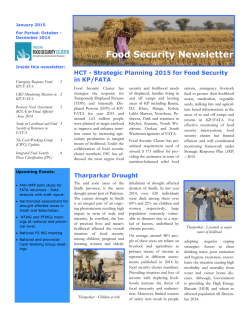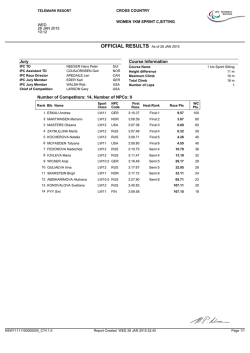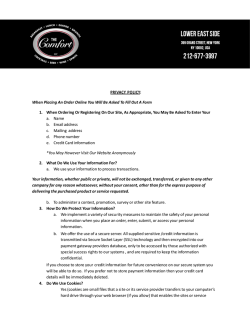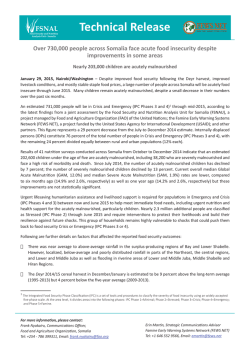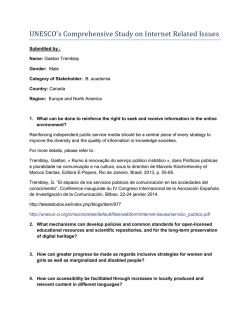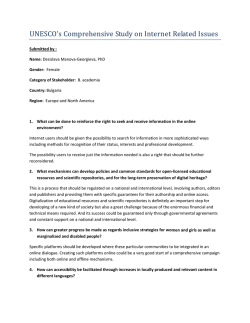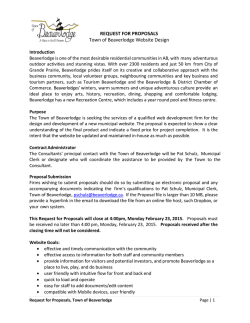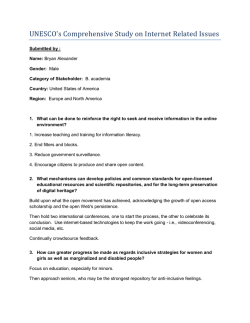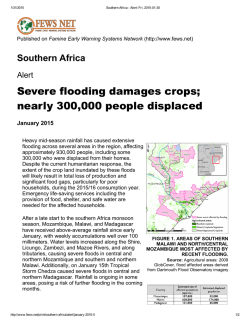
request for proposals website redesign
REQUEST FOR PROPOSALS WEBSITE REDESIGN REQUEST FOR PROPOSALS The Information and Privacy Commissioner of Ontario is requesting proposals for the services of a web design firm to provide a redesign its website. Proposals will be received by: The Information and Privacy Commissioner of Ontario Until: 4:00 p.m. Local Time, January 30, 2015 Potential Proponents must register their intent to submit by advising the contact person below by email. This request for proposals is available free of charge only from the Information and Privacy Commissioner of Ontario’s website at www.ipc.on.ca. No hard copies of this document will be provided. Proposals from those not registered may, at the sole discretion of the IPC, not be considered. Potential providers may only participate in this procurement process by submitting a proposal. Tenders or quotations will not be accepted. It is the policy of the Information and Privacy Commissioner of Ontario to proactively disclose all contracts entered into with a value of more than $10,000. Rob McMahon, ABC Director of Communications Information and Privacy Commissioner of Ontario 2 Bloor Street East, Suite 1400 Toronto, ON M4W 1A8 416-326-3902 [email protected] 1 SECTION 1 – INFORMATION FOR POTENTIAL PROPONENTS 1. Purpose of the Project The Information and Privacy Commissioner of Ontario (IPC) currently has multiple web presences on different platforms with varying appearance, architecture, and presentation of content. The purpose of the project is to unify the content as well as the look and feel in one corporate site. In addition, the IPC’s websites are required to meet the Accessibility Standard for Information and Communications under the Accessibility for Ontarians with Disabilities Act (AODA). The IPC will also take this opportunity to ensure the content is equally available in both official languages. Upon completion of the development of the new integrated website and a six (6) month deployment period, the IPC will require the successful proponent to provide website maintenance services including installing software updates, patches and other technical support. It is a requirement of the proposal to outline recommended scenarios and associated costs for a three to five-year period. All content, code, intellectual property and graphics will become the sole property of the IPC. 2. RFP Schedule EVENT RFP Release Date DATE January 5, 2015 Last Day to Submit Email Inquiries January 16, 2015 Addendum To RFP Released (if necessary) January 23, 2015 Proposal Submission Deadline January 30, 2015 On-Site Presentations by Short-listed Proponents (if necessary) Negotiation with Preferred Proponent(s) and Execution of Agreement Final Project Delivered Week of February 9, 2015 Week of February 16, 2015 November 30, 2015 The IPC, at its sole discretion, may change the dates outlined above. 3. Evaluation and Selection Process The evaluation and selection process is divided into five (5) stages. Details are provided in Section 4. 2 SECTION 2 - BACKGROUND AND SCOPE OF WORK 4. Objective Our objective in redesigning the IPC website is to provide relevant, engaging and easy to understand information to our wide ranging stakeholders including the general public, institutions covered under our legislation, media, academics, the legal community, elected officials, access and privacy experts and other related organizations. The site must be easy to use and navigate, be AODA compliant, offer multilingual capabilities and function across multiple devices and operating systems. 5. About the IPC The role of the Information and Privacy Commissioner is set out in three statutes: the Freedom of Information and Protection of Privacy Act (FIPPA), the Municipal Freedom of Information and Protection of Privacy Act (MFIPPA) and the Personal Health Information Protection Act (PHIPA). The IPC acts independently of government to uphold and promote open government and the protection of personal privacy. The term “freedom of information” refers to public access to general records relating to the activities of government, ranging from administration and operations to legislation and policy. It is an important aspect of open and accountable government. Privacy protection is the other side of that equation, and refers to the safeguarding of personal information held by government and personal health information held by health information custodians. Together, these three Acts establish rules about how government organizations and health information custodians may collect, use, and disclose personal information, including personal health information. They also establish a right of access that enables individuals to request their own personal information, including personal health information, and have it corrected if necessary. In general terms, the Commissioner’s mandate is to: Independently review the decisions and practices of government organizations concerning access and privacy; Independently review the decisions and practices of health information custodians in regard to personal health information; Conduct research on access and privacy issues; Provide comment and advice on proposed government legislation and programs; Review the personal health information policies and practices of certain entities under PHIPA; and Help educate the public about Ontario’s access, privacy and personal health information laws and related issues. The Commissioner delivers on this mandate by fulfilling seven key roles: Resolving appeals when government organizations refuse to grant access to information; Investigating privacy complaints related to government-held information; 3 6. Ensuring that government organizations comply with FIPPA, MFIPPA and PHIPA; Conducting research on access and privacy issues and providing advice on proposed government legislation and programs; Educating the public about Ontario’s access, privacy and personal health information laws and access and privacy issues; Investigating complaints related to personal health information; and Reviewing policies and procedures and ensuring compliance with PHIPA. Scope of Services The purpose of this RFP is to solicit the services of an expert website design firm with demonstrated experience in managing complex website redesign projects using off-the-shelf content management systems (CMS) with minimal custom coding as well as expertise in best practices for content architecture, user interface design and deployment. The proponent must also outline its ability to train website administrators and content contributors. The proponent should also outline its support capabilities (e.g. how and when website support is available) for the first six months after deployment as well as a three to five year period following. The new website must be accessible across multiple devices (including mobile), browsers and operating systems as well as leverage social media channels and establish social engagement and interaction with target audiences through information/promotion sharing, etc. It must also be easy to navigate, have content available in English and French, and be accessible to persons with disabilities by conforming to the WCAG 2.0 Level AA standard. Given the nature of the work of the IPC, the new website must be as protective of privacy as possible. This means the use of cookies must be minimized, no tracking cookies may be used and Do Not Track preferences must be respected. Proponents are strongly encouraged to review the IPC’s Privacy Policy and understand our privacy commitments. Currently the IPC has four websites: The Information and Privacy Commissioner of Ontario (www.ipc.on.ca) Annual Report (annualreport.ipc.on.ca) *retiring July 2015 Privacy by Design (www.privacybydesign.ca) Privacy by Design Centre of Excellence (coe.privacybydesign.ca) The intention is to combine all the content, function and services from the above sites into one under the IPC website. The Proponent will be responsible for the content architecture while IPC will be responsible for content development and translation. 4 7. Research In planning for the new website, the Proponent will: i. Plan and facilitate one-on-one interviews with up to ten (10) stakeholders at the IPC’s offices to explore their perspectives, ideas, and requirements in order to establish a basis for determining a web design; ii. Develop and execute an online survey to explore the perspectives, ideas, and wish list of existing visitors; iii. Document, summarize, analyse and interpret the information from the one-on-one interviews and online survey. This report should be sensitive to the varied interests of stakeholders but also attempt to identify common perspectives; iv. Review the current website and available relevant data and documentation provided by the IPC; v. Meet with IPC staff to ensure familiarity with the requirements in order to develop a detailed Business Requirements Document; and vi. Work with IPC staff to develop a new site map and content migration plan. 8. Required Elements Proponents must demonstrate in their proposal their ability to deliver the following required elements: Design, Look and Feel i. Browser compatibility (ie. Internet Explorer, FireFox, Chrome, Safari); ii. Web-site content accessible by mobile devices including but not limited to: Android, iPhone and BlackBerry with varying operating systems, using the device’s browser programming standards (e.g. WAP); iii. Simple and intuitive design; iv. Clean look and feel; v. Support for multiple languages; vi. Capability to display prominent urgent notice messages on the homepage with ability to link to other pages; vii. Flexibility in skinning and incorporation of IPC branding; and viii. Pictures, videos. Accessibility i. Compliance with the Accessibility for Ontarians with Disabilities Act, 2005 (AODA) and Ontario Regulations under the AODA, conforming with WCAG 2.0 Level AA standards; ii. Ability to increase and decrease text size on all web-pages; iii. Ability to support text to speech technology (e.g. Browse Aloud); iv. Ability to support various screen reader (e.g. JAWS); and 5 v. Compliance with provincial privacy and access legislation as well as the Federal Privacy Act and the Personal Information Protection and Electronic Documents Act. Interactivity i. Integration of IPC social media channels; ii. Social media sharing from any page; iii. Event calendar functionality with ability to add to Outlook, iCalendar, Google Calendar, etc.; iv. Ability to create online forms, including feedback forms, eNewletters and polls/surveys; v. Canada's Anti-Spam Legislation (CASL)-compliant subscription/unsubscribe tool; vi. Forms capable of being created and maintained by the IPC; and vii. Live or recorded streams, webcams; Security and Privacy i. The site must be fully HTTPs-enabled by default; ii. Personal information from visits must be collected only when voluntarily provided by users for specific purposes; iii. Respect the Do Not Track signal of user agents; iv. Minimize the use of persistent cookies and especially third-party tracking cookies, including flash cookies and locally shared objects; v. The site design must maximize in-house hosting services and minimize any need to transfer, share or receive identifiable information of visitors to or from third parties; vi. An industry recognized service such as Mobify and HTML5 is to be used to ensure proper mobile ready; vii. Online forms must use some form of verification (CAPTCHA) technology to prevent bots from automatically filling in and submitting forms; viii. Web contact and submission forms must not expose IPC email addresses to visitors or crawlers. ix. The website must be secured against common vulnerabilities (e.g. SQL injection, XSS and other attacks) ; and x. The website must have the ability to provide secure access to certain areas for staff or public depending on specific requirements. Content Management i. Role based access for multiple administrators/users with different security and access levels; ii. Templates for different content types, i.e. events, presentations, content, orders, etc.; iii. Ease of use; iv. Time based publishing with expiry date of content option; v. Broken links reporting; vi. List of links; and vii. Photo and Video Gallery with mandatory metadata for each image or video. 6 Search Engine Optimization (SEO), Site Search and Analytics i. Meta tags, alt tags and other SEO fields; ii. Search engine friendly site map, ability to block pages from spiders; iii. Privacy protective search engine; and iv. Integration of current Piwik analytics program with opt-out provisions and using de-identified data. Documentation and Training i. Full documentation for the backend operation of the CMS, including detailed descriptions of any modifications, customizations and custom code. ii. Provide a complete user guide and deliver training on operating the new CMS for IPC staff. i. Integrate the Decisia self-publishing platform for IPC decisions and orders. ii. Work with Lexum, the provider of Decisia to graphically skin the platform to ensure a consistent look and feel. Orders 7 SECTION 3 – SUBMISSION PROCESS 9. General Submission of a proposal indicates acceptance by the proponent of all the terms, conditions and specifications contained in the RFP. All of the provisions of this RFP are deemed to be incorporated into each proponent’s proposal. Deviations from the RFP must be clearly identified and explained in the written submission. The proponent authorizes the collection by the IPC of the information set out in this RFP. Proponents may include in their proposals specific additional/optional services, which they deem may be of value to enhance the achievement of the project objectives and ultimately the goal and which are not expressed or implied in the terms of reference of this RFP. Proponents must provide a succinct description of the additional/optional services along with an explanation of the benefits of the additional/optional services in the proposal and submit the price(s) of additional/optional services separately. The IPC reserves the right to purchase any, all, or none of the proposed additional/optional services at its sole discretion. The IPC, at its sole discretion, reserves the right to reject any or all proposals at any stage of the process. No proponent shall have any claim for any compensation of any kind whatsoever as a result of participating in this RFP process, including but not limited to claims based on the participation or non-participation of any person or entity and claims based on decisions to be made at the sole discretion of the IPC. By submitting a proposal, the proponent agrees that decisions to be made at the sole discretion of the IPC may be made only with regard to the best interests of the IPC and without regard to any effect such decision may have on the interests of any proponent or any other person or entity. 10. Closing Date and Time Proponents are to submit three written copies of their proposals as well as one electronic version on CD or USB memory stick, in the same envelope, to the IPC no later than 4:00 p.m. on Friday, January 30, 2014 to: Information and Privacy Commissioner of Ontario 2 Bloor Street East, Suite 1400 Toronto, ON M4W 1A8 Proponents may amend or withdraw a proposal prior to the closing date and time. All proposals become irrevocable upon closing time and may not be changed. Proposals received at the IPC’s reception desk later than the specified closing time may, at the sole discretion of the IPC, be returned unopened to the proponent. 11. Required Information The proposal shall include: i. Cover page with the contact information of the proponent and its contact person responsible for the proposal including respective mailing addresses, telephone numbers, fax numbers, and email addresses; ii. Table of Contents; iii. Executive Summary that provides a high level description of the proposal. This summary should not exceed two (2) single-sided pages; 8 iv. Brief description of your understanding of the objectives, and of the services; v. Demonstration of the following: Proponent’s business entity is a sound and viable enterprise providing website design and development services; Extensive knowledge of, and experience in providing expert web content design and development services using off-the-shelf content management systems, specifically in the public, business and corporate services sector; Proven track record of successfully meeting deadlines for similar work for contracts of comparable size, scope, nature and complexity for public sector clients (in particular various levels of government) and/or for private sector clients; Ability to assign a dedicated manager with excellent communication (written and oral), organizational, and expediting skills; Ability to deliver all the required elements as outlined in Section 2; Ability to be proactive and innovative, and effectively use decision-making skills; and Ability to work and achieve results expeditiously, and complete services on time/by critical dates and on budget; vi. Proposed services including description of the proposed approach and methodology to managing and performing the services, i.e. the ways the proponent proposes to conduct the work and convey key information – all in a direct, clear, concise, efficient and timely manner. vii. Proposed resources including: Indication of the specific staff of the proponent, including the proponent staff project manager, who will be performing the work and their individual experience and qualifications. Submit résumé/curriculum vitae of each resource (include academic and professional credentials, relevant web content design and development services knowledge and experience – particularly in the public, business and corporate services sector, comparable work experience, and tenure with your firm); Demonstration of your ability to dedicate specific resources, particularly the proponent’s staff manager/lead, to and for the duration of the agreement to expedite the services and maintain service standards, level of quality and continuity; and Provide a description of your contingency plan; viii. Description of your ability to meet the deadlines including critical deadlines; ix. Detailed description of acceptance testing procedures; x. Any other comments or suggestions relating to the successful performance of services; xi. The completed Reference Form– references must be relevant and for the proponent’s office that would be performing the services (under Contact Name, include the individual who has specific knowledge of the services); xii. Indication of any value added services that may be available free of charge; and xiii. Samples of similar work. 9 12. Questions/Clarifications Enquiries regarding this RFP must be directed by email to Rob McMahon, Director of Communications at [email protected]. No clarification requests will be accepted by telephone. Enquires will be received no later than 4:00 p.m. on January 16, 2015. No enquiries are to be directed to any other employee or representative of the IPC. Directing of enquiries to other persons may, at the sole discretion of the IPC, result in the proponent’s submission being rejected. Responses to clarification requests will be provided to all registered proponents by email in the form of an Addendum. Any changes to the RFP, prior to the proposal closing, will be issued as an Addendum. The IPC will not provide oral instruction or suggestions. Failure to acknowledge all Addenda in submissions may, at the sole discretion of the IPC, result in the proponent’s proposal being rejected. 10 SECTION 4 – EVALUATION AND SELECTION PROCESS 13. General An evaluation team made up of the IPC’s representatives and such other persons/advisors as may be selected by the IPC will conduct the evaluation of proposals. The proposal evaluation results shall be the confidential property of the IPC. By responding to this RFP, proponents agree to accept the recommendations of the evaluation team as final and binding. The proponent whose proposal, in the sole and absolute discretion of the IPC, best meets the requirements of the IPC will be designated as the “preferred proponent” but no obligation will arise until an agreement based on the accepted proposal has been authorized by the appropriate IPC authorities and is negotiated and executed. 14. Multi Stage Process The evaluation and selection process consists of five stages described below. Proponents may be required to provide additional information to support the evaluation and selection process at any stage. Also, the evaluation team may, at any stage, perform a further detailed evaluation taking into account analyses by the IPC together with such other considerations that the evaluation team deems, at its sole discretion, necessary to complete its assessment. Stage 1: Proposal Completeness and Compliance with Mandatory Requirements (Pass/Fail) The evaluation team will initially screen the proposals for essential information and completeness, and compliance with mandatory requirements set out in Section 2. Only proposals that the evaluation team, at its sole discretion, deems compliant, i.e. are complete and have met the mandatory requirements, (including proposals for which all clarifications were satisfactorily resolved) will pass and proceed to Stage 2 of the evaluation and selection process. All other proposals shall be disqualified. Stage 2: Qualifications of Proponent/Proponent Staff and Proposed Services (Maximum 80 Points) Proposals that passed from Stage 1 will be analysed and rated in Stage 2. Proponents’ responses will be evaluated on the basis of, at minimum, the following criteria to assess the strengths and abilities of proponents and the merits of the offered services to determine which proponents are most responsive to the IPC’s requirements and deemed most qualified in Stage 2: i. Suitability and competence of proponent and of proponent team members as demonstrated by relevant qualifications including proven experience, capacity, expertise and knowledge, understanding of the services; and ability overall to perform the services; and ii. Quality, scope and appropriateness of offered services to perform the work and achieve project objectives by critical deadlines. Reference Checks Detailed reference checks (of the proponent’s office that would be performing the services) may be taken into consideration in Stage 2 or any stage of the evaluation and selection process. 11 Evaluation Matrix Below is the evaluation matrix that indicates the criteria and the points allotted for each criterion, which the evaluation team will use to evaluate the proposals received. CRITERIA POINTS ALLOCATED Completeness, understanding and approach 20 Creativity and ability to deliver the required elements 20 Experience in delivering similar projects on time and on budget 20 Ability to assign appropriate staff 10 Warranty, maintenance and training of staff 10 Stage 3: Evaluation of Proposal Price Data (Maximum 20 Points) The IPC may, at its sole discretion, create a Stage 3 short list of proponents that the IPC deems most responsive to its requirements and most qualified from the Stage 2 evaluation. Only proponents on the Stage 3 short list will have and their price data considered and rated in Stage 3. Only proponents achieving a sufficiently high score, as determined at the sole discretion of the IPC, in Stage 2 and Stage 3 combined may be further considered. Stage 4: Proposal Presentations The IPC may, at its sole discretion, create a short list of proponents that the IPC deems most responsive to its requirements and most qualified from the Stage 2 and 3 evaluations and invite each short-listed proponent to present their proposal to the evaluation team at the proponent’s own expense. The presentation will be divided into three sections and be limited to one hour. The format of the presentation will be: i. Company Profile – 5 minutes ii. Solution Presentation and Demonstration of Work – 40 minutes iii. Questions and Answer Period – 15 minutes Upon completion of the presentations by the short-listed proponents, the evaluation team will review the Stage 2 and 3 evaluations and make adjustments based on the information obtained in the presentation. Based on the reevaluated scores in Stage 4, the IPC may, at its sole discretion, reject any or all proposals. Stage 5: Negotiation with Preferred Proponent(s) Based on its evaluation of the proponents and their respective proposals, the IPC , at its own sole discretion, may select one or more preferred proponents, for the purpose of good-faith negotiations to enter into an agreement for the provision of services. Negotiations may include negotiating changes, amendments or revisions to the proposal of a selected proponent and such other terms and conditions as the IPC determines are required to be included in an agreement. The selection of preferred proponent(s) does not obligate the IPC to enter into an agreement with selected preferred proponent(s). If, after 14 days of negotiations the IPC is not able to enter into an agreement with one or more of the preferred proponent(s), the IPC may, at its own sole discretion, terminate negotiations with the preferred proponent(s) and enter into negotiations with any other proponent(s). The IPC may, at its sole discretion, decide not to enter into an agreement with any of the proponents. 12 APPENDIX A – REFERENCE FORM Each Proponent shall provide the reference information as requested in this RFP. References must be relevant and be of the proponent’s office that would be performing the services. REFERENCE #1 REFERENCE #2 REFERENCE #3 Company Name: Company Address: Contact Name: Contact Title: Contact Telephone Number: Date Services Undertaken: Date Services Completed: Description of Contract, Contract Value: 13
© Copyright 2026
